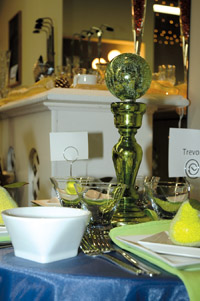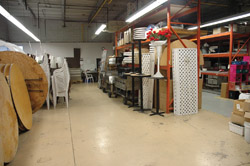
Committed to event success
By Chris Skalkos
Features Party and event ProfilesKaren Bolliger, Tiffany Party Rentals, Barrie, Ontario.
 |
| Karen Bolliger is the owner of Tiffany Party Rentals in Barrie, Ontario. |
Karen Bolliger says the key to success in party and special event rentals rests with the people who are the first point of contact with customers. Bolliger, the owner of Tiffany Party Rentals in Barrie, Ontario, is speaking from experience. After more than 20 years serving this segment of the market, she often sees repeat customers, 10 or more years later, who come back because the people in her company made their first event a success.
Bolliger inherited Tiffany Party Rentals from her mother Ann who, prior to getting into party rentals, helped her husband operate a tool rental store in Alliston, Ontario. “My mother worked there a couple of days per week. One day a customer asked if they rented chinaware and silverware. Mother said ‘not at this time but give me a couple of days’ and she went out to get them. From that day, she decided to get into party rentals,” says Bolliger, adding that her mother went to Toronto to source supplies and purchased two patterns of china (Wedgewood and Thomas). “She didn’t want to carry the hotel quality products. At the time these were top quality products. Those were the days when people hung on to patterns for a long time and Mom wanted to transfer that mentality to her rental business and only rent good quality china.”
 |
 |
| A key factor in the company’s sales effort is its showroom which is always set up with table setting displays months in advance of the upcoming season. The company’s showroom is large enough to show several table setting combinations. |
She says that her mother looked for a different location from her father’s rental store because she did not want to mix this new product line with the tools and equipment, so she purchased a small house in Barrie to run the business from. “In the 1970s, the concept of renting was new and people thought my mother was crazy. Who wants to rent other people’s china? But her experience from working at the tool rental store gave her the confidence that she knew how to make it work,” explains Bolliger. “It wasn’t easy. It took time to build up the business and it wasn’t overnight growth.”
However, the demand was there and the business grew, especially among the catering industry as caterers in town were glad to have the option of renting instead of buying their own chinaware and glassware. “Mom kept adding inventory according to customer demand. That’s how we operate to this day. I was around when all of this was getting off the ground, helping Mom. We had a lot of fun together so when she started to talk about retirement, I was listening,” says Bolliger, adding that changes in technology were shifting the nature of business in general. “The computer age was upon us at that point and that really scared her.”
Bolliger bought the business in 1988 and continued to add inventory, and grew to serve other areas of the special event rental market. “The company has really changed as the years progressed. We were growing slowly and we didn’t realize it because it happens naturally. Mom continued being a part of the business after her retirement and I was grateful for that because she had an incredible memory, she knew exactly what inventory we had which made the transition easier.”
Another key to the company’s growth was the addition of employees Rob Langlois, operations manager, and Andriana Sides, event planner and customer service specialist. Langlois, who has been with the company for more than 15 years, says a significant factor in the company’s growth was moving to its current location. The company operates out of two leased units in an industrial strip mall that is 7000 square feet and boasts a large 26 by 36 foot showroom, offices and warehouse with an in-house dishwashing and laundry facility.
 |
 |
| Rob Langlois, operations manager, and Andriana Sides, event planner and customer service specialist. |
The company started with six and eight foot rectangular tables which were built by Bolliger’s father. They later added round tables as the demand grew and now carry seven different sizes and styles of rectangular tables and round tables ranging from 24, 30, 48, 54 and 60 inches. “The 60 inch tables were popular when we bought them and are still popular today,” says Langlois, adding that the 24 inch table line is the company’s newest addition to its inventory and the 42 inch ‘Cruiser’ tables are requested for cocktail events and are highly popular among the caterers.
The company has six different styles of chairs and offers chair covers in a variety of fabrics and colours to fit the rental chairs, as well as chair covers to fit chairs found in local venues. Its linen line is extremely diverse featuring more than 30 different colours.
Both local and out-of-town caterers use the company’s services with about 20 percent of the company’s revenues being derived directly from them. Weddings and related events make up approximately 50 percent of the company’s revenues with the balance coming from corporate or private functions. Tiffany Party Rentals specializes in weddings, especially outdoor weddings, and has earned a solid reputation in this market. “We offer a complete package delivered right to the site, everything from the dance floor and staging to the salt and pepper shakers,” says Langlois. The company works with Barrie Tent and Awning, a Canadian manufacturer of large marquee tents, to which they sub-contract tent rentals.
“The customer deals with just one person. Offering a one stop convenience for the customer is important. We are easy to deal with and this provides a stress-free experience for the customer. The happier they are, the better for us. We are really good at handling customers under stress,” he says, adding that patience is the key skill required above all else. “It’s not uncommon to see a customer place an order and then call back to change everything. We have had some clients change their order 15 times, but you can’t roll your eyes at them. That’s when the patience comes in handy. In this business we have to expect that.”
A key factor in the company’s sales effort is its showroom which is always set up with table setting displays months in advance of the upcoming season. “We start setting tables in January to get people thinking about the spring, and that could change several times before spring arrives,” Langlois explains. “A lot of customers are price conscientious but when they see the finished product… a complete table setting, their attitude is day to night difference. This allows customers to see different themed set-ups which helps them visualize what their event will look like.
 |
| One of the fastest growing trends the company has spotted has been in table top centerpieces with the industry going from the little ‘hurricane lamps’ to 30 inch tall elaborate centerpieces. |
“When we set our table displays, we are setting a precedent for customers to get ideas for a table setting and our showroom is large enough to show several combinations as well as combining smaller tables for larger settings,” he adds. “We see a customer point to a table and say ‘I want that and everything on it for my event’. The showroom is a visual tool and a seller in itself!”
Langlois says another factor helping party rental companies today is the proliferation of suppliers and new products to the market. “Fifteen years ago, it was difficult to find suppliers and they were expensive. Now there are several and they are offering very good products,” he says. In addition, the company visits The Rental Show put on by the American Rental Association (ARA) to find new products and keep up with emerging trends.
“For the last 10 years we have seen a lot of offshore products that are improving in quality. Now you can get tables made in China from a local supplier. Prior to that we had to pay somebody to make them,” he says. “Now it’s no longer cheaper to make our own tables.” Langlois adds that they look to their suppliers for more than just product support. “We rely on suppliers and re-sellers for their specialized knowledge about what rental companies can benefit from.”
This added flexibility makes it less risky to experiment with new products. “If a client asks for something we don’t have, we are willing to buy it, put it out on display in the showroom and see if it rents,” he says, adding that everybody is involved in deciding if a new product will be marketable in the future. “Nine out of ten times it works out,” he says.
One of the fastest growing trends the company has spotted has been in table top centerpieces. “Centerpieces in the last five to six years have really broken out in this market. The industry went from the little ‘hurricane lamps’ to three foot tall elaborate centerpieces. For the first few years of business, we only rented out hurricane lamps,” says Langlois, but cautions to be wary of items that offer a short-term ‘flash-in-the-pan’.
 |
| Tiffany Party Rentals operates out of two leased units in an industrial strip mall that is 7000 square feet and boasts a large 26 by 36 foot showroom, offices and warehouse with an in-house dishwashing and laundry facility. |
“The chocolate fountains were popular for two years until everybody realized how much work they are. We stick to traditional beverage fountains,” he says. After years of experience, however, Langlois says veteran rental operators will easily spot products that they know will work. An example is a ‘Fill’N’Chill table that replaces traditional ice troughs. “It drains from the bottom so you don’t have to flip it. I first saw it at the ARA show in Atlanta and I knew it was a renter.”
Bolliger says there are several positive factors making the climate for party rental companies easier to do business, new product trends fueling consumer interest, more suppliers offering better quality products for less, and the growing use of the internet and other computer technology as a resource and sales tool. However, she says, behind all of that are the employees. “They are the key to success because it all comes back to service,” says Bolliger. “Be patient and show them the value we can add to their event. We can have the best product around but if you don’t take care of customers, you can’t go back in time to make it right. The key to success is the people who work here.” -end-
Print this page
Leave a Reply